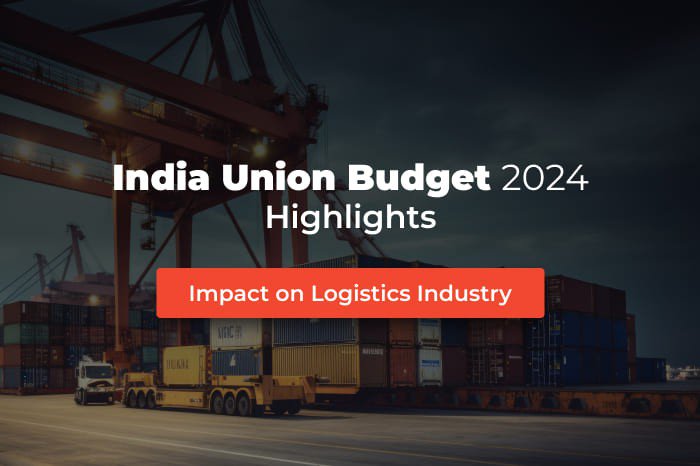
India's Union Budget 2024 has delivered a significant boost to the logistics sector, positioning it as a key driver of economic growth and infrastructure development. With a focus on enhancing connectivity, streamlining supply chains, and reducing logistics costs, the budget introduces various initiatives aimed at improving transportation networks, including roads, railways, and ports.
These measures are expected to strengthen India's position as a global trade hub, attract foreign investment, and support industries that rely heavily on efficient logistics. As the government emphasizes technological advancements and green logistics, the sector is poised for substantial transformation and expansion.
Indian Union Budget 2024: Boosting Logistics Sector
Expanding and Strengthening the EV Ecosystem
- Infrastructure Expansion: The government plans to expand manufacturing and charging infrastructure to bolster the electric vehicle (EV) ecosystem.
- Consumer Benefits: Reduction in logistics costs and taxes translates to lower prices for goods and services, making consumers the primary beneficiaries.
Three Major Economic Railway Corridors
- Government Initiative: In the Interim Budget 2024, the government announces plans for three major economic railway corridors to alleviate congestion and reduce logistics costs in India.
- Corridor Programs: The identified programs include energy, mineral, and cement corridors, port connectivity corridors, and high-traffic density corridors.
- Facilitating Faster Movement: Dedicated corridors aim to facilitate faster movement of freight, improve turnaround times, and reduce logistics costs for India.
PM Gati Shakti and Multi-Modal Connectivity
- Commodity-Specific Corridors: Projects identified under the PM Gati Shakti for enabling multi-modal connectivity, addressing congestion issues, particularly in the eastern region.
- Logistics Competitiveness: With logistics costs currently accounting for approximately 12% of India's GDP, reducing traffic and improving freight transportation efficiency is crucial for enhancing competitiveness.
Calls for Clarity on Sustainable Logistics
- Government Intent: While the government expresses its intent to spur sustainable logistics with a focus on EVs, industry players feel the lack of specific numbers and concrete measures.
- Financial Support: Calls for additional clarity on financial support and waivers for companies involved in green logistics to encourage active participation in the transition.
- Comprehensive Mapping: Advocacy for a comprehensive mapping of outcomes and benefits of flagship projects like PM Gati Shakti and the national logistics policy to ensure transparency and help businesses leverage initiatives.
Promising Future for Logistics Industry
- Economic Corridors Impact: Introduction of economic corridors promises to cut logistics costs, while reduced corporate tax and GST benefits streamline trade and result in cost savings for 3PL.
- Efficient Future: Overall customs improvements and a dynamic future for the logistics industry are set in motion with a decline in import release times.
Mixed Reactions from Industry Stakeholders
- Positive Aspects: Finance Minister Nirmala Sitharaman's budget receives praise for additional funds in infrastructure development, emphasis on upgraded roads, and plans to enhance transportation systems.
- Expectations and Misses: Industry stakeholders express expectations for ease of doing business, including an increase in the GST threshold limit, and an anticipated amnesty scheme for GST compliance.
Conclusion: Navigating Towards a Dynamic Future
The Budget 2024 brings a transformative wave for the logistics sector with a focus on infrastructure development, economic corridors, and sustainable logistics. The expansion and strengthening of the EV ecosystem signal a shift towards greener transportation, benefiting both consumers and the industry. While the three major economic railway corridors promise to reduce congestion and logistics costs, industry stakeholders express a need for clarity on sustainable logistics measures.
The positive aspects of the budget, including increased infrastructure allocation and streamlined trade procedures, set the stage for a promising future. However, calls for addressing specific expectations, such as ease of doing business and clarity on financial support for green initiatives, highlight areas for further refinement. As the logistics industry prepares to embrace these changes, a comprehensive mapping of outcomes and benefits becomes essential to ensure that the envisioned advantages permeate through the entire spectrum, especially benefiting MSME-based logistics players.
Overall, the Budget 2024 lays the groundwork for a dynamic and efficient future, but the road ahead requires a collaborative effort between the government and industry stakeholders to maximize its potential.





 Get instant quote
and compare offers in real time
Get instant quote
and compare offers in real time